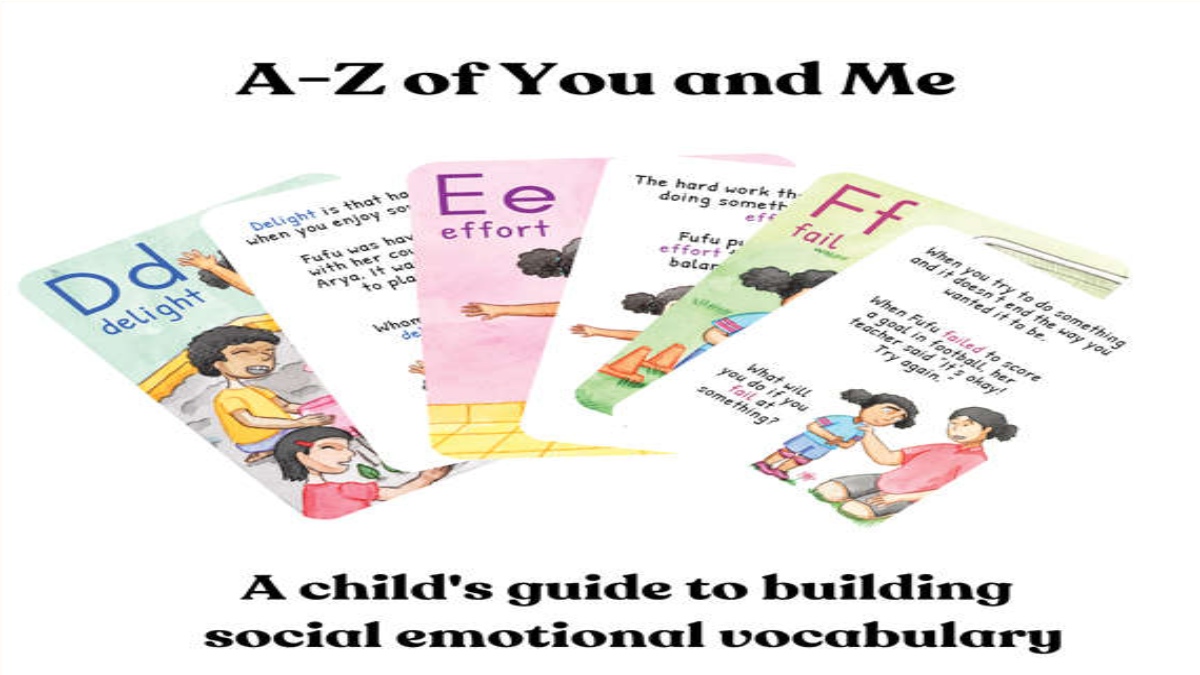


Early childhood is a tricky age. Children grow at a rapid pace, and so do their cognitive skills. In this overwhelming phase, they may not be able to understand or cope with the myriad emotions and social situations they encounter, which leads to them acting out in and being difficult.
Mental health professional Drishti Goenka who is also the Founder and CEO of learning design venture Journey Matters says, “Managing a class full of three-something-year-olds can be very challenging. There is a dearth of well-trained teachers. The ages 3-6 are foundational years not only for academics but also social-emotional development (SEL).”
This was the reason she decided to launch her own set of alphabetic flashcards aimed purely at the social-emotional development of young children. Called the A-Z of You and Me, these flashcards offer an SEL word for every alphabet, which is defined in a child-friendly manner and accompanied by illustrations of a situation depicting that word as well as a reflective prompt for the adult to discuss with the child.
Goenka shares, “There are some great learning products out there, but none that focus on alphabets. The most unique thing about my product is the sheer simplicity of the concept. Every child learns the alphabet. All these years, educators and parents have been teaching A for Apple without much thought. All over the world, in small towns and villages, when a child is introduced to the English language, they are taken through A for Apple and B for Ball. Why can’t we capitalise on this basic structure of learning and make it a more meaningful experience for children? It builds on the child’s social-emotional vocabulary, which will help them to understand themselves better and connect with people as well.”
Her alphabet flashcards can be ordered directly from their website journeymatters.co.in, and soon will be available on third-party retailers as well. The product can also be shipped internationally and is well-suited for children of the age of four and above.
“With this product in hand, teachers will have all the information they possibly need to ensure that the child has understood the word. I will also release an open-source YouTube channel with more facilitation ideas lasting 2-3 minutes for each alphabet. When children don’t understand their own feelings or are unable to express their thoughts, they exhibit behaviours that can become difficult to manage. Our product equips teachers and parents with the tools needed to foster growth in the classroom,” explains Goenka.
The words used in this set of flashcards were decided collaboratively by the illustrator, content head and Goenka herself. They went through a ‘word dump’ exercise, where for each alphabet they brainstormed all SEL related words they could possibly find. After this, they sent out a google form to educators and parents with young children asking them which words would be most suitable for their target age group and which ones they would want their children to learn. Based on those responses the words were finalised. However, she says, “Parents and educators can certainly go ahead with more words for each letter. It needn’t be restricted to what we have chosen. The idea is to kickstart such conversations between the adult and a child.”
Goenka’s A to Z of You and Me is a great example of the kind of learning tools required for the children of today. With screen addictions on the rise and lack of access to physical schooling, children are grappling with many issues their parents and teachers never faced before. It is therefore essential for caregivers to ensure a sense of normalcy and wellbeing for their children while creating an environment for healthy learning.
These kinds of SEL products focus on normalising the concept of talking about feelings, and in turn, making children more empathetic and more compassionate. They also help in the formation of healthy relationships. There is definitive research available to show that when SEL is introduced at an early childhood level and continues all through a child’s schooling, it significantly reduces the possibility of future mental-health-related concerns. This is a wake-up call that all parents and educators should adhere to.
The writer pens lifestyle articles for various publications and her blog www.nooranandchawla.com. She can be reached on nooranand@gmail.com.